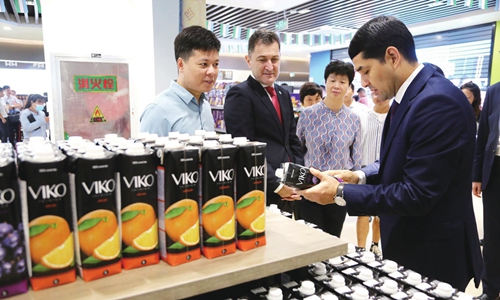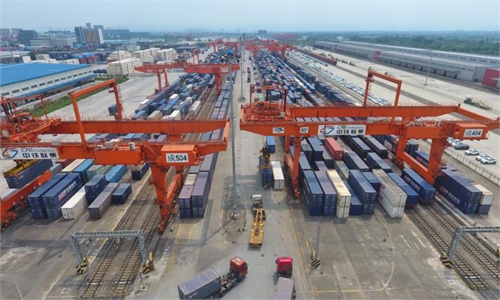
Merchants promote goods to visitors at the cross-border e-commerce experience center of Lianyungang Free Trade Zone in Lianyungang, East China's Jiangsu Province, in August 2020. Photo: IC
Shanghai Ymatou Network Technology Co (Ymatou), a Chinese cross-border e-commerce platform, bagged hundreds of millions of investment in its D-round funding in March led by China's CGP Investment.The Shanghai-based e-commerce platform was China's first independent cross-border one-stop shopping site. In 2017, it received around $100 million in its C-round funding from investors including China Merchants Capital Management.
The successful pooling of funding of Ymatou represents growing buying power of China's consumers despite the COVID-19 pandemic, as the COVID-19 is changing the traditional retail model and has given a strong boost to online shopping platforms and will benefit overseas manufacturers and exporters, experts say.
Booming imports
Compared to China's explosive export through e-commerce represented by internet giant Alibaba, China's e-commerce import industry has a relatively short history. However, the growth of the e-commerce import has also been rapid thanks to the growing demand for quality products from Chinese consumers.
According to a report by think tank 100ec.com, China's imports through e-commerce rose to more than 2.47 trillion yuan ($379.4 billion) in 2019, up 30 percent year-on-year, with more than 125 million Chinese consumers trying to get quality imported products through e-commerce platforms.
The massive market has attracted several other e-commerce companies apart from Ymatou. Tmall Global, an e-commerce platform under Alibaba connecting oversea retailers and their products with Chinese consumers, was launched around 2015. Netease Kaola, which was later acquired by Alibaba was also launched around the same time.
"The expansion of the import-focused e-commerce platforms shows the rising demand for quality goods, and that the Chinese market represents an opportunity that many foreign manufacturers, brands and exporters cannot miss," Tian Yun, vice director of the Beijing Economic Operation Association, told the Global Times.
According to a report by market research firm iiMedia, in the first quarter of 2021, 40.3 percent of the Chinese cross-border e-commerce users saw their purchasing power increase. More than 65 percent of the users also were using the cross-border e-commerce platforms more frequently.
"The coronavirus has forced many offline stores to shut down," Tian said, "but it is also an opportunity for companies and brands to shift to online. Foreign brands will have to take that opportunity to penetrate further into the Chinese market, where the e-commerce model is already very mature."
On Alibaba's Tmall, a slew of international luxury brands have opened up their stores to appeal to Chinese customers. The official flagship stores of cosmetic brands are offering more products with discounts on Tmall than duty-free shops, including Clarins, Estee Lauder, Lancôme, SK-II, Sulwhasoo, YSL and Armani.
Imported agricultural products are also finding their way into the Chinese consumer market through e-commerce in recent years.
In 2019, a total of $5.29 billion worth of agricultural products were traded cross-border online in China, including $4.98 billion worth of imports, up 18 percent compared to the previous year, according to statistics from the Ministry of Agriculture and Rural Affairs. By the first half of 2020, the total value of imports of agricultural products on e-commerce has risen to more than $2.9 billion, a growth of more than 27 percent.
The most popular items include dairy products, seafood products and soft drinks. The trade has significantly benefited some top trade partners in the sector, including Australia, the US, New Zealand, the Netherlands and Germany.
Challenges and opportunities
Hannah Sun, a representative from Shanghai Fengyi Imports and Exports Co. told the Global Times that her company's business scope includes importing cherries from Chile, Turkey and other fruits from Southeast Asian countries, and their sales on Tmall was growing exponentially, and the sales of their imported cherries on e-commerce platforms, including Tmall and JD.com, can represent up to 80 percent of their total sales.
However, according to Sun, the impacts from COVID-19 on her imports business have been nothing short of devastating.
"We stopped all our cherries imports not long after there were positive results tested from imported cold-chain fruits," Sun said, "And now we mostly buy fruits in Yunnan and supply them to fruits stores here in Shanghai."
Sun said that although health experts said that the chances are low to get the coronavirus from imported fruits, which are usually shipped in above zero temperatures, the management of her company still fears the imports business will be vulnerable to policy uncertainties, so they decided to shift to the domestic fruits market.
But for many other companies, shifting from importing was not that easy, and the risks associated with imported agricultural products mean that their e-commerce business was held on suspense for several weeks at the height of the worry.
According to a manager surnamed Wu from a seafood company selling aquatic products on Taobao.com, his company's sales can be up to around 100,000 yuan per day thanks to the e-commerce platform, but his business was completely cut off after traces of coronavirus were detected on a batch of shrimps imported from Ecuador, which is also where he bought his shrimps from.
The impact of COVID-19 on e-commerce was not only felt by the importers whose products are associated with high contamination risks. Online retailers of clothing and other daily necessities have also faced similar challenges due to enhanced quarantine procedure for goods and disrupted international shipping.
"But the impacts will be only short term compared to the long-term policy stimulus targeting the cross-border sector," Tian said, "Especially with the rollout of the duty free policies for Chinese customers to purchase products from abroad."
In 2020, thanks to duty free zone established in South China's Hainan Province, the imports through e-commerce witnessed 7.53 times increase year-on-year, with total import value at 526 million yuan.
"The policy to increase the duty free products, and the reduction in tax will further increase Chinese consumers' purchasing power, and as long as overseas supply becomes stabilized, the Chinese market will play an even more important role in their sales," Tian said.

